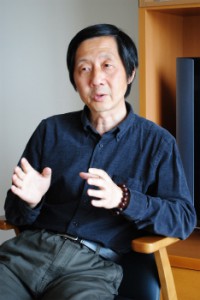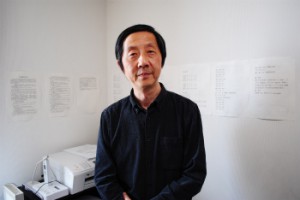Mr. Wang Jian, Tokyo Bureau Chief, China News Service (China)
post date : 2014.06.02
 This is the third time Tokyo Bureau Chief Jian Wang of the China News Service has been posted in Japan. “There are many lessons that China and other countries can learn from how Japan has faced current or past problems.” We interviewed him about his impressions of Japan and his attitude toward his work.
This is the third time Tokyo Bureau Chief Jian Wang of the China News Service has been posted in Japan. “There are many lessons that China and other countries can learn from how Japan has faced current or past problems.” We interviewed him about his impressions of Japan and his attitude toward his work.
–Did you always want to be a reporter?
I actually wanted to become a writer, and majored in Chinese literature in university. But at the time I attended university, from 1979 to 1983, there were still some lingering remnants of the Cultural Revolution. It was not a time when students could decide their own future. Universities would take student preferences under consideration and look at their academic ability and aptitude before deciding on a job for them. So although I didn’t actually want to become a reporter, I was interested in learning more about the current state of society was, and so after graduating from Shanghai’s Fudan University in 1983 I joined the China News Service.
–When did you first come to Japan, and under what circumstances?
My first posting was from 1990 to 1995. Former Tokyo Bureau Chief Yang Guoguanghad lived in Japan until high school, and was looking for a young correspondent who spoke Japanese. But at that time, there was almost no one available in our company with the language skills necessary to function as a reporter. I was suggested for the position as I had studied Japanese at university, but I had only learned introductory conversational Japanese. The company suggested I study Japanese for a year at a Chinese university, which convinced me to take the posting in Japan. I took a Japanese language training course, targeted at students planning to study in Japan, at Renmin University of China in Beijing and studied while working.
–What wend through your mind when your posting to Japan was decided?
It didn’t seem particularly special to me. At the time, there were a lot of Japanese movies with Ken Takakura and TV shows starring Momoe Yamaguchi available in China, so I felt like I understood life and culture in Japan. Compared to the West, Japan didn’t seem much like a foreign country; it seemed familiar. Nevertheless, there were only a few reporters from the entire mainland who were working overseas, so it was a rare opportunity. When I actually came to Japan, I had difficulty with the language barrier. People didn’t speak slowly like they had in my university classes, so it was hard to pick up everything people were saying, especially over the phone. In order to get used to listening to Japanese, I kept my TV on at all times, even when I was sleeping.
Changing Japan-China Relations
–Have you noticed Japanese society changing between your different postings?
The first time I came to Japan was right in the middle of the economic bubble. Everything seemed new to me. At the time, Japan’s economy was significantly beyond China’s, and what struck me most was Japan’s wealth and rationality. When I look back on it now, the Chinese media at that time tended to only report on positive aspects of Japan. My second posting was from 2003 to 2007, after the collapse of the bubble. In between my first and second posting China had experienced rapid economic growth, and relations between the two countries were the best they had been since the war. When I came in 2003, I felt that Japanese people had become a little more impatient. Since my third posting started in February, I think I’ve become able to see the problems with both China and Japan. With greater familiarity, the flaws become more noticeable.
–Which story made the biggest impression on you?
The Kobe earthquake. I took a car to go cover it, and things were in such a terrible state that the experience didn’t seem real. But what surprised me the most was that even after a disaster like that, people were still acting in an orderly manner. People were just calmly cleaning up as if nothing had happened. Even when convenience stores in Kobe were left open, no one stole from them. There were a lot of Chinese residents in the area, so people in China were very interested in any news about the earthquake and it was given a lot of coverage.
–Was there any reaction in China or Japan to the articles you published?
One of the issues I covered was that the Chinese school the local Chinese community had been using as a shelter wasn’t an official evacuation center designated by the local government, and so they were not receiving relief supplies. I don’t know whether it was due to my article or not, but two days later they received supplies. Once the Japanese government became aware that there were a significant number of people taking shelter in Chinese schools, they provided the same aid as they did to official shelters. After the 1923 Tokyo earthquake, there were false rumors spread about Chinese and Korean people. Therefore there were concerns that the same thing would happen in Kobe, but nothing of the sort happened. In fact, everyone worked together and helped each other get through the crisis. It was very moving.
Lessons to Learn from Japan
–What kind of themes are you covering now?
There are a number of areas in which Japan is the first country in Asia to have experience. Personally, I feel it is worthwhile to cover news that could be useful to China. For instance, a rapidly aging society will be an issue for China soon enough, as it already is in Japan, so I am interested in reporting on nursing homes and the like. I covered the air pollution in Yokkaichi before, and air pollution is now a problem in China. With the Future of Elderly Care in Super-Aging Japan FPCJ press tour held on May 13, I focused on the social issue of vacant houses that could also occur in China in the future due to a population decline. Although an aging population and vacant houses are different problems, thinking of a solution that solves both problems simultaneously is quite interesting. I am interested in how Japan deals with issues, and the process involved in their solution.
–What is the secret to maintaining your passion as a reporter?
The first time I came to Japan, I went on a tour of a Toyota car factory and was inspired by the work I saw there. The movements of the craftsmen and their dedication to their work were very impressive. The best part of Japan is its spirit of craftsmanship. As a foreigner, it is something I feel we can learn from. Since the China News Service only has two Tokyo correspondents, we have to cover all subjects, and it is difficult to switch from covering politics one day to economics the next. We also take pictures and film videos in addition to writing. But whenever I come to Japan, more than usual I think “If I’m going to do this job, then I’m going to give it my all.” That might be thanks to Japan.
----------------------------------------------------------------------------------------------------------------------------------------------------------------------
Born in Shanghai in 1957. Graduated from Fudan University in Shanghai with a degree in Chinese literature. Joined the China News Service in 1983. Held positions at the Shanghai office as a reporter, head reporter, and vice president. Posted to Japan as a correspondent from 1990 to 1995 and 2003 to 2007. Returned to Japan in February 2014.
Established in 1952. One of the two largest state news agencies in China. Head office is located in Beijing, with 3000 employees worldwide. Overseas bureaus located in eight countries. Release news to domestic media and Chinese media outlets worldwide. Subsidiaries include the www.chinanews.com news site and one of China’s most influential weekly magazines, China News Week.
----------------------------------------------------------------------------------------------------------------------------------------------------------------------





